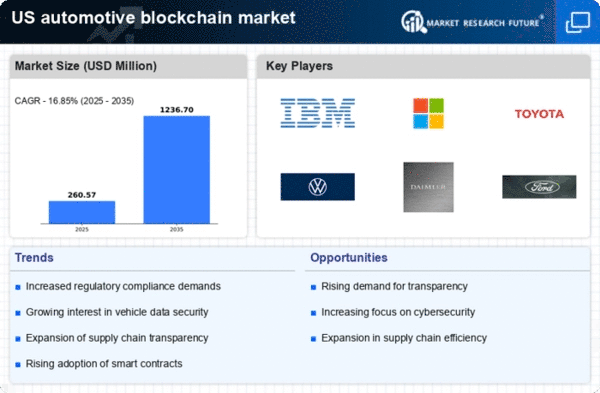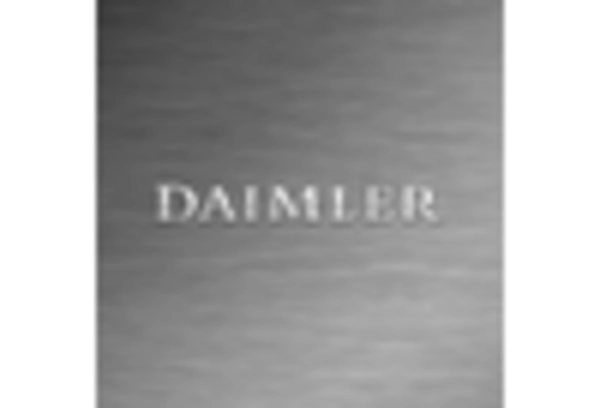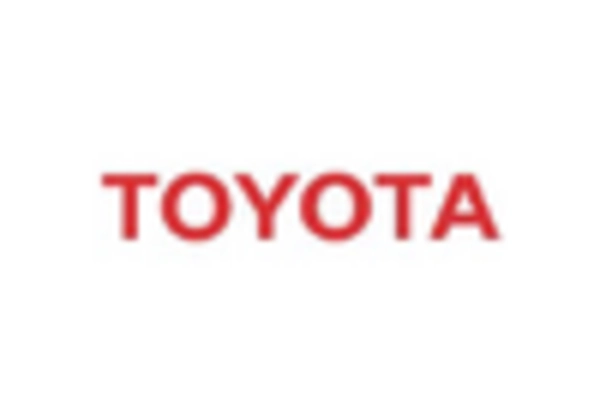Rising Focus on Sustainability
Sustainability is becoming a critical driver in the automotive blockchain market. As consumers and regulators increasingly demand environmentally friendly practices, manufacturers are exploring blockchain to enhance supply chain transparency and reduce carbon footprints. In 2025, approximately 40% of automotive companies are expected to implement blockchain solutions to track and verify sustainable sourcing of materials. This shift not only helps in meeting regulatory requirements but also appeals to eco-conscious consumers. By leveraging blockchain technology, companies can provide verifiable proof of their sustainability claims, thereby enhancing their brand reputation and competitiveness in the automotive blockchain market.
Integration of IoT with Blockchain
The convergence of Internet of Things (IoT) technology with blockchain is poised to revolutionize the automotive blockchain market. As vehicles become increasingly connected, the need for secure data exchange between devices becomes paramount. By 2025, it is projected that over 50% of new vehicles will be equipped with IoT capabilities. This integration allows for real-time data sharing and monitoring, which can enhance vehicle performance and safety. Moreover, blockchain provides a secure framework for managing this data, ensuring that it remains tamper-proof and accessible only to authorized parties. This synergy between IoT and blockchain is likely to drive innovation and investment in the automotive blockchain market.
Collaboration among Industry Stakeholders
Collaboration among various stakeholders in the automotive sector is emerging as a key driver for the automotive blockchain market. Manufacturers, suppliers, and technology providers are increasingly recognizing the benefits of working together to develop blockchain solutions that address common challenges. In 2025, it is expected that partnerships will account for over 35% of blockchain initiatives in the automotive industry. This collaborative approach facilitates knowledge sharing, accelerates innovation, and reduces implementation costs. By pooling resources and expertise, stakeholders can create more robust and effective blockchain applications, thereby propelling the growth of the automotive blockchain market.
Increased Demand for Vehicle Traceability
The automotive blockchain market is seeing a surge in demand for enhanced vehicle traceability. This trend is driven by the need for manufacturers and consumers to verify the authenticity and history of vehicles. In 2025, it is estimated that around 30% of consumers prioritize traceability features when purchasing vehicles. This demand is further fueled by the rise in vehicle theft and fraud, prompting manufacturers to adopt blockchain solutions to provide transparent records of ownership and maintenance history. Consequently, the automotive blockchain market is likely to expand as stakeholders seek to implement systems that ensure the integrity of vehicle data, thereby enhancing consumer trust and satisfaction.
Enhanced Consumer Experience through Personalization
The automotive blockchain market is likely to benefit from the growing emphasis on personalized consumer experiences. As automotive companies strive to differentiate themselves, they are increasingly utilizing blockchain to offer tailored services and products. By 2025, it is anticipated that around 25% of consumers will prefer vehicles equipped with personalized features enabled by blockchain technology. This could include customized insurance options, maintenance alerts, and loyalty rewards based on driving behavior. Such personalization not only enhances customer satisfaction but also fosters brand loyalty, making it a vital driver for growth in the automotive blockchain market.
















